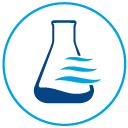
Is Water Safe to Drink?
Let’s find out!
Let’s find out!
1. Brief Overview of Water Testing
It is very important that we not take our drinking water for granted. Safeguarding our most basic necessity is vital for our health and well-being. Testing our water is important because ever since the Industrial Revolution we have continuously produced, used and released man-made chemicals into our water, land and air. These chemicals leach through our soil and subterranean layers to contaminate our water sources and unfortunately they may end up in our kitchen faucet! The majority of these man-made contaminants are dangerous to our health and can cause a variety of health issues. They can upset the stomach, attack the nerve system, damage the skin, or cause cancer, among other things.
Another problem arises as water pipes age and decompose. Metals such as copper, lead, iron can be released causing contaminated drinking water to flow through these pipes and the elevated levels of metals or rust pose hazards to human health.
Even though drinking water provided by water utilities is regulated by the U.S. Environmental Protection Agency (EPA), we hear of cases of contaminated drinking water all over the country.
2. Signs that your tap water might not be safe to drink!
A- Smell of Bleach
This could mean the presence of too much chlorine in your water. Most public water facilities treat their drinking water with some chlorine to kill dangerous bacteria, germs and pathogens. In fact if chlorine levels are too low then there is a possibility for the parasite giardia to cause serious stomach issues for those who drink it. But if levels of chlorine get too high it can easily mix with other organic compounds creating some harmful byproducts like trihalomethanes (THMs), which have been linked to kidney problems and increased cancer risk ; or haloacetic acids (HAAs), which cause skin irritation and may increase cancer risk.
B- Brown or Yellow color in tap water
If your tap water is yellow that could be a sign of the presence of chromium-6, a cancer-causing chemical. Tap water that is brown or orange may signal an excess of iron, manganese, or lead, or may be an indication of rust, which can breed bacteria.
C- Slimy feeling on your hands after washing
If your hands still feel slimy after washing them, that is a sign you have hard water. Hard water is most often caused by a buildup of calcium or magnesium salts, and it usually leaves white deposits on your sink, faucet, or drinking glasses. Hard water doesn’t necessarily mean you have contaminated drinking water — in many cases, it is just an excess of calcium or magnesium, which shouldn’t cause any harm. However, like in Flint, MI it could indicate the presence of another more dangerous metal like aluminium, manganese, and lead.
D- Blue or Green color in tap water
If your tap water has a blue or green tint, this is often a sign of corrosion in copper pipes. Even though copper does not pose a danger for you in small doses, if you are exposed to high levels of copper it can lead to health problems including anemia and kidney and/or liver damage.
E- Cloudiness in water
Not all cloudiness in drinking water is a bad sign, but water that is safe to drink should ideally be clear with no odor or funny taste. Therefore one thing to check for when looking for contaminated drinking water is cloudiness. Though not necessarily dangerous to your health, cloudiness sometimes signals the presence of unsafe pathogens or chemicals.
F- Rotten egg smell
As you might be able to guess, if your water smells like sewage or rotten eggs that is a sign of potentially contaminated drinking water. Water can contain hydrogen sulfide, a colorless gas that can naturally occur in groundwater, and when this gas gets exposed to certain bacteria, it will convert into sulfate, which is a cause of diarrhea and dehydration.
G- A metallic taste
When old water pipes begin to rust, they can release metals like iron, manganese, zinc, copper, and lead into local water supplies. The presence of these metals in the water gives the liquid a metallic, or salty, taste. In fact it was a foul metallic flavor that helped Flint, MI residents identify the presence of lead in their drinking water. However, in some cases that metallic taste is simply a sign of a low pH. So testing is always important to get to the truth of the matter.
H- A fishy smell
If your water smells like fish that could be a signal that there is an excess of barium in your water. Barium is a naturally-occurring element that may seep into water supplies because of drilling or manufacturing in the area of your water source. If the barium levels in your water spike above the EPA’s recommended levels, it can result in some health issues like high blood pressure, muscle weakness, or damage to the kidneys, liver, and/or heart.
Another option for water that smells fishy is that it might contain cadmium. Cadmium is an element found in lead and copper ores. It too can leach its way into water supplies and wells through industrial waste. Elevated levels of cadmium in drinking water can contribute to kidney, liver, and bone damage.
3. What Solutions are There?
At Torrent Lab we recommend that you never take the quality of your drinking water for granted. We have a lot of great ideas for how to make water safe to drink.
Be aware of the external changes, like those listed above, that might have impacted the quality of your drinking water. For instance, a helpful way of checking if water that smells fishy is safe, is to pour a glass of tap water and take it to a separate room. If after stirring the water a bit it still smells like fish, it could mean that contaminants like cadmium or barium are present.
Let a commercial Laboratory perform high quality water tests on your drinking water periodically to ensure its purity. One of the ways we can most effectively help you with how to make water safe to drink is by regularly testing your drinking water or, at the very least, testing your drinking water any time you are aware of changes in its color, smell, taste or feel.
Invest in your and your family’s well being. Pay close attention to the taste, color and smell of your drinking water. Keep your senses actively Investigating to identify if any of the changes listed about are occurring with the quality of your drinking water.
If you ever have any questions about your drinking water quality, make inquiries with your water supplier, with the health department or with your city or municipality.
4. Conclusion
Torrent Laboratory, Inc., is a state of California certified (CAL ELAP) Laboratory. Torrent Laboratory employs only EPA approved testing procedures (Test Methods) and services, all of which meet every quality control analytical and documentation requirement demanded by California regulating authorities.
Torrent has decades of experience and our chemists have a combined 150 years of analytical expertise. We know exactly how to serve you! Our final reports contain an additional attachment that includes the Federal Guidelines so that you can compare your water quality data. In addition, our relationship doesn’t just end once you receive your data–Torrent is always available to answer any additional questions or concerns. Send us an email at customerservice@torrentlaboratory.com and we’ll be happy to discuss your report with you.
We know that there are some cheap pre-packaged water testing kits available. What they are unable to do is to detect contaminants in the part per billion and part per trillion range. Also, prepackaged test kits are useless when it comes to comprehensive water quality testing! Municipality-delivered tap water, bottled water, home-filtered water, and well water all have unique characteristics that pre-packaged kits do not necessarily address or check. Torrent understands all of our client’s situations are unique, which is why we spend time with you up-front to find out exactly what you are interested in determining. Our pre-analysis consultation services will often help give us information that allows us to consider unique possibilities that the pre-packaged kits cannot take into consideration. Such information may very well make all the difference as we test to determine how to make water safe to drink for your family.
To order your water testing kit, simply fill out our Water Quality Testing Form, and we’ll be in touch to have a conservation regarding the next steps.






